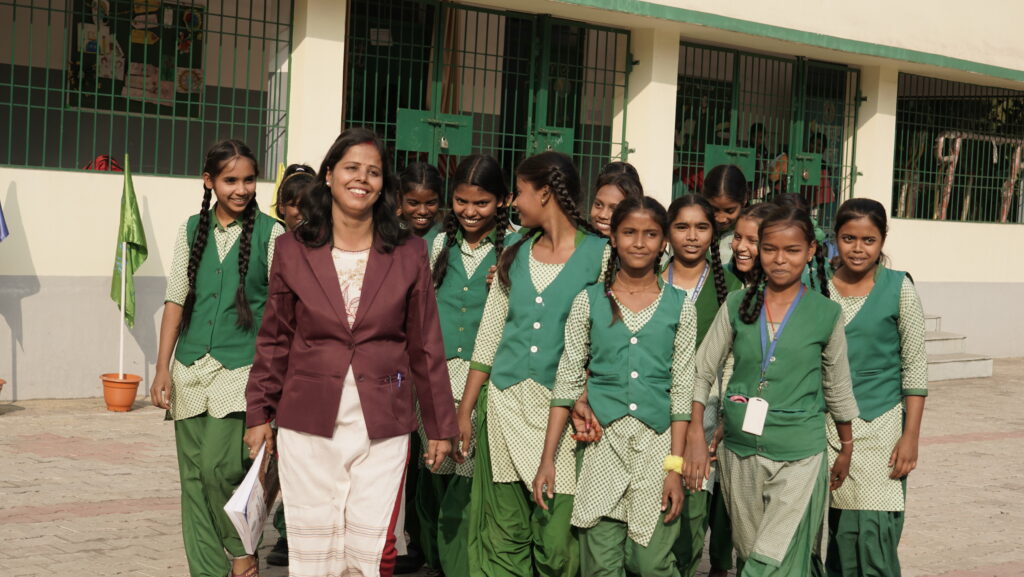Growing up, my parents prioritised my education, even though many of the girls around me were not given the same educational opportunities as boys in their family. This journey helped me understand the significance of education and inspired me to become a teacher.
For me, being a teacher is not just about imparting knowledge but contributing to children’s brighter future. Having worked in government schools, I have closely interacted with students coming from adverse backgrounds. Therefore, it is of utmost importance to me to ensure that the school creates spaces where students feel safe and protected, express their feelings without fear of being judged and can reach their full potential. The way I teach is largely shaped by my own experiences as a student.
During my school days, I wanted to become a house captain to lead the school parade. While I could be selected as a Captain, the school preferred to give this role to students who excelled in academics; and I became the Vice-Captain. Once in the absence of the House Captain, I got the opportunity to lead the school annual day parade. Even after doing a good job, I was never selected as the House Captain again. This impacted me emotionally. I felt so helpless that no one was there to listen to me, and exam scores became a marker of my abilities. As a teacher now, I try to ensure that none of my students feel like they have failed.
Most of the students in my school face multidimensional adversities like poor financial background, broken homes and some are child labour victims. I try to create a space where they feel comforted, protected, heard and the Harsh Johar curriculum, which is being implemented in our school, is a helpful tool. Recently, Shweta (name changed), a very attentive, cheerful, confident and hard-working student, who joined our school in 9th grade, began to isolate herself from the rest of her class. She also started wearing a mask to cover up her face. Noticing changes in her behavior, I spoke to her individually and found that she had recently got braces for her teeth. After a while, when she stopped coming to school, I reached out to her parents to inquire and requested them to encourage their daughter to attend school. Despite returning to school, she kept away from her classmates. During one of the Harsh Johar sessions, she shared about her parents’ intention to get her married. She had to get braces done on her teeth as her parents believed that it would make her look good. I spoke to her after class and encouraged her to take a stand for herself. I also shared about my mother and her unfulfilled desire to complete her studies. My mother belonged to a generation where she could not take decisions for herself, but today, girls can. I assured Shweta that she has my full support in whatever decision she takes. With a newfound self-respect and support, Shweta regained her confidence and developed a sense of awareness about her goals, desires and expectations from life. She is now in the first year of graduation and desires to be a teacher.

Social-emotional learning based Harsh Johar Curriculum provides teachers with different ways to create safe spaces for students. When we take classes with 40-50 students, it becomes crucial to be attentive to understand the mental and emotional state of each student. What has worked for me is to make the extra effort to understand the background of my students and encourage communication with them beyond classes. During the class, I maintain eye contact with them. I also try to track long absences of students. Harsh Johar activities along with regular academic tests help me understand student engagement and involvement. It is not easy, especially when we get preoccupied with administrative engagements, it becomes difficult for us to focus on students beyond academics. Here, having a curriculum like Harsh Johar gives me the space to understand students’ vulnerabilities. It has provided me with the avenues to connect with students better and more organically.
Recently during a Harsh Johar session, I asked my students to write a letter to God anonymously. Some of the letters were funny and interesting. However, some students had expressed their challenges and expectations from God. Reading those letters affected me emotionally. Some students hesitated to write the truth for fear of being bullied by their peers. I tried to gain their trust in person so that they could share in a safe space.
When I was a student, my teachers decided for me; sometimes against my wishes. I wanted to confront my teachers, but always feared being ignored. This made me more hesitant to share my feelings. When I became a teacher, my primary goal was to ensure that my students felt heard. I keep track of their academic performance as well as their social and emotional well-being. This is important to ensure holistic student development. I have noticed that as soon as students start to feel comfortable in the school environment, they are more likely to improve their academic performance. They also exhibit more positive behavior when trusted and respected. To create such a space, we need to develop our own understanding of social emotional learning. By being empathetic, listening actively and building strong relations with students, we can provide an appropriate school environment where all children can thrive. This is critical to prepare a generation which is resilient against adversities and paves their own way towards thriving.
About the Author:
Sumeeta Srivastava has been teaching English for 14 years and is currently posted at Jharkhand’s Chief Minister School of Excellence (Girls), Sakchi, Jamshedpur as a Trained Graduate Teacher (TGT-English). For her, being a teacher is not just a responsibility to the school but a commitment to the nation in shaping the future generation.
Varsha Singh, Associate Manager, Systems Demonstration, Dream a Dream has worked along with Sumeeta Ma’am to write this article.


